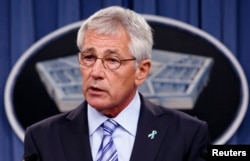JERUSALEM —
Budget-strapped Israel is pressing the United States to conclude a deal extending defense aid beyond 2017, when Washington's current $3 billion annual payouts to its Middle East ally expire, officials said on Friday.
They said a swift agreement on future U.S. grants would help Israel's military draft a five-year austerity plan accommodating Prime Minister Benjamin Netanyahu's conservative government.
“It's difficult to budget into 2018 and 2019 without knowing what funds will be available,” an Israeli defense official said.
U.S. Secretary of Defense Chuck Hagel will visit Israel next week and the future aid will probably be raised by his hosts, according to a different official who declined to be identified by name or nationality.
The previous Republican administration signed a 10-year deal with Israel in 2007 granting it $30 billion, most of it going on American defense products.
U.S. President Barack Obama, a Democrat, has sparred with Netanyahu over Iran's nuclear program and peacemaking with the Palestinians. But support for Israel's security remains strong in Washington - even as policymakers there slash spending on a range of U.S. military programs.
“Our two nations are forever bound by our shared history and our shared values, and every American dollar spent on Israel's security is an investment in protecting the many interests that our nations share,” U.S. National Security Adviser Susan Rice said on Friday, concluding three days of consultations in Israel.
Israel's Defense Ministry and the U.S. embassy in Israel declined comment on the aid negotiations, which are under way.
Increased funding sought
A U.S. official briefed on the talks and who spoke on condition of anonymity said Israel was seeking an overall increase to between $3.2 billion and $3.5 billion a year, while the Obama administration had spoken of $2.8 billion.
The allies would probably settle on $3 billion “or thereabouts,” the official predicted, adding that Israel “wants to get this worked out as soon as possible”.
Israel's defense budget of around $14.5 billion has been challenged by Finance Ministry demands to cut $870 million. Netanyahu's security cabinet in December separately approved a $930 million boost to the defense budget, but the military says it needs more to contend with proliferating regional threats.
“We cannot bridge this budget rift,” Defense Minister Moshe Yaalon told Israeli lawmakers on Wednesday. “There has been a mortal blow to training, to readiness and to fitness.”
A senior Israeli military officer said the belt-tightening had put the brakes on David's Sling, a missile interceptor developed jointly with U.S. firm Raytheon Co. and which is being considered for purchase by Poland as it accelerates its defense preparations in response to the Ukraine-Russia standoff.
David's Sling could be operational in Israel in a year, the officer told reporters on Thursday - but only if more funds were found.
“The moment you don't have the money, you pull back on the development and on getting the kit in the field,” he said.
In addition to the annual defense grants, Washington has separately helped bankroll Iron Dome, a shorter-range Israeli rocket interceptor system already deployed. Rice put the amount of U.S. funds earmarked for Iron Dome at nearly $900 million.
They said a swift agreement on future U.S. grants would help Israel's military draft a five-year austerity plan accommodating Prime Minister Benjamin Netanyahu's conservative government.
“It's difficult to budget into 2018 and 2019 without knowing what funds will be available,” an Israeli defense official said.
U.S. Secretary of Defense Chuck Hagel will visit Israel next week and the future aid will probably be raised by his hosts, according to a different official who declined to be identified by name or nationality.
The previous Republican administration signed a 10-year deal with Israel in 2007 granting it $30 billion, most of it going on American defense products.
U.S. President Barack Obama, a Democrat, has sparred with Netanyahu over Iran's nuclear program and peacemaking with the Palestinians. But support for Israel's security remains strong in Washington - even as policymakers there slash spending on a range of U.S. military programs.
“Our two nations are forever bound by our shared history and our shared values, and every American dollar spent on Israel's security is an investment in protecting the many interests that our nations share,” U.S. National Security Adviser Susan Rice said on Friday, concluding three days of consultations in Israel.
Israel's Defense Ministry and the U.S. embassy in Israel declined comment on the aid negotiations, which are under way.
Increased funding sought
A U.S. official briefed on the talks and who spoke on condition of anonymity said Israel was seeking an overall increase to between $3.2 billion and $3.5 billion a year, while the Obama administration had spoken of $2.8 billion.
The allies would probably settle on $3 billion “or thereabouts,” the official predicted, adding that Israel “wants to get this worked out as soon as possible”.
Israel's defense budget of around $14.5 billion has been challenged by Finance Ministry demands to cut $870 million. Netanyahu's security cabinet in December separately approved a $930 million boost to the defense budget, but the military says it needs more to contend with proliferating regional threats.
“We cannot bridge this budget rift,” Defense Minister Moshe Yaalon told Israeli lawmakers on Wednesday. “There has been a mortal blow to training, to readiness and to fitness.”
A senior Israeli military officer said the belt-tightening had put the brakes on David's Sling, a missile interceptor developed jointly with U.S. firm Raytheon Co. and which is being considered for purchase by Poland as it accelerates its defense preparations in response to the Ukraine-Russia standoff.
David's Sling could be operational in Israel in a year, the officer told reporters on Thursday - but only if more funds were found.
“The moment you don't have the money, you pull back on the development and on getting the kit in the field,” he said.
In addition to the annual defense grants, Washington has separately helped bankroll Iron Dome, a shorter-range Israeli rocket interceptor system already deployed. Rice put the amount of U.S. funds earmarked for Iron Dome at nearly $900 million.






